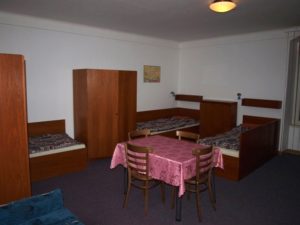This year marks 20 years of activities of the Terezin Memorial Education Department, the workplace which mainly focuses on direct work with school children by organizing training seminars on the role of Terezin during World War II. Initially it was not a simple task since the political change in 1989 led to a massive decline in interest in the Terezin issues on the part of the youngest local visitors to the memorial. However, it is thankfully no more the truth.
Seminars planned for Czech schools were initially conceived as a one day event only. However, opening a hostel in Terezin Magdeburg barracks in 1997 brought a certain change in this matter and resulted in an extended offer of the Education Department, which could start running also multi-day seminars. A few years later, further accommodation premises in Fučíkova Street were added to the existing capacity. The programme of both overnight and day teaching activities consists of lectures, workshops, visits, film screenings with commentaries, interviews with survivors, etc. The Department currently uses six classrooms, one of which is equipped with twenty computer stations. Seminars are not intended only for Czech school children, but also for students from abroad, especially from German speaking countries, which is under the care of volunteers from Germany and Austria who are regularly sent to Terezin Memorial for one year by the German organization Aktion Sühnezeichen Friedensdienste – ASF and by the Austrian institution Gedenkdienst.

Accommodation sites for participants of the seminar, Meeting Centre in the Magdeburg Barracks, Terezin
Running workshops for schools is not the only job description of the Education Department. For instance, since the mid-90s there have been annually announced art competitions for young participants to tackle the issues related to the danger of anti-Semitism, racism, totalitarianism, etc. This year already XIX year of the literary and XVII year of the art competitions have been announced (more to be found in the Newsletter 3/2013). Every year the best works are compiled into travelling exhibitions installed at many places in the CzechRepublic. Competitions are financed mainly from donations of the former ghetto prisoner Ms. Hana Greenfield.
The Terezin Memorial is also involved in further education of teachers. The beginnings of this work were very modest. In collaboration with the School District Office in Litoměřice, we first organized cycles of lectures on the history of the region with regard to World War II, Terezin repressive facilities and CC Flossenburg branch in Litoměřice. Later, they were followed by several days seminars organized by the Terezin Memorial in cooperation with the German organization Aktion Sühnezeichen Friedensdienste – ASF, which were attended by both Czech and German teachers, and which eventually grew into regular Czech-Brandenburg seminars. Currently, these are to a large extent organized by some of the partner organizations of the Memorial such as the National Institute for Further Education – NIDV or the Regionale Arbeitsstellen für Ausländerfragen, Jugendarbeit und Schule Brandenburg (Regional Jobs for Immigrants, Youth Work and School) – RAA Brandenburg. In addition, since 2000 the Terezin Memorial has been organizing a regular cycle of trainings for Czech teachers in close liaison with the Czech Ministry of Education, Youth and Sports and in cooperation with many inland and foreign organizations. These seminars are currently of a four stage structure: The 1st and 2nd stage take place in the Czech Republic (Terezin Memorial, Jewish Museum in Prague), the 3rd stage in some foreign European institution similar in character to the Terezin Memorial (Ravensbrück Memorial, State Museum Auschwitz-Birkenau), and the 4th stage has been taking place in the Israeli Yad Vashem in Jerusalem since 2005. These seminars are the direct result of the conference called Holocaust Phenomenon, which took place in Prague and Terezin under the auspices of the President of the Czech Republic Mr. Vaclav Havel in 1999. Educational seminars have been also organized since 2005 for teachers of the SlovakRepublic, since 2010 for teachers from France and occasionally even for teachers from other countries (e.g. Denmark).
In addition to the above-mentioned regular training activities, other fitful projects are also implemented serving mostly for the creation of educational materials for Czech teachers and their pupils. Let us mention those of the recent years. First of all, it is the publication titled “Terezin Ghetto, Holocaust and Today”, which is one of the outputs of the project conducted within 2007-2009 in close collaboration with the USC Shoah Foundation Institute. The publication is also available in electronic form on the website of the aforementioned institution (see Newsletter 1/2010). Most recently, the department has launched a website for young people and teachers with the title “Schoolchild in the Protectorate” (Newsletter 1/2013), which contains a great deal of interesting things and facts from the life of school children at the time of the Protectorate as well as methodological material for teachers. Work on this website also involved the creation of topical workshops, which are available in the offer to school groups. Last but not least to mention is the project “Tracing Little Memorials” (Newsletter 1/2012).
The Terezin Memorial has devoted past 20 years to extensive educational activities. However, it is necessary to emphasize that its work results would have been much poorer without the support of many partner institutions, government bodies and individuals. Our boundless gratitude therefore belongs to all of you who have supported us in the past two decades. Thank you!
Šp



